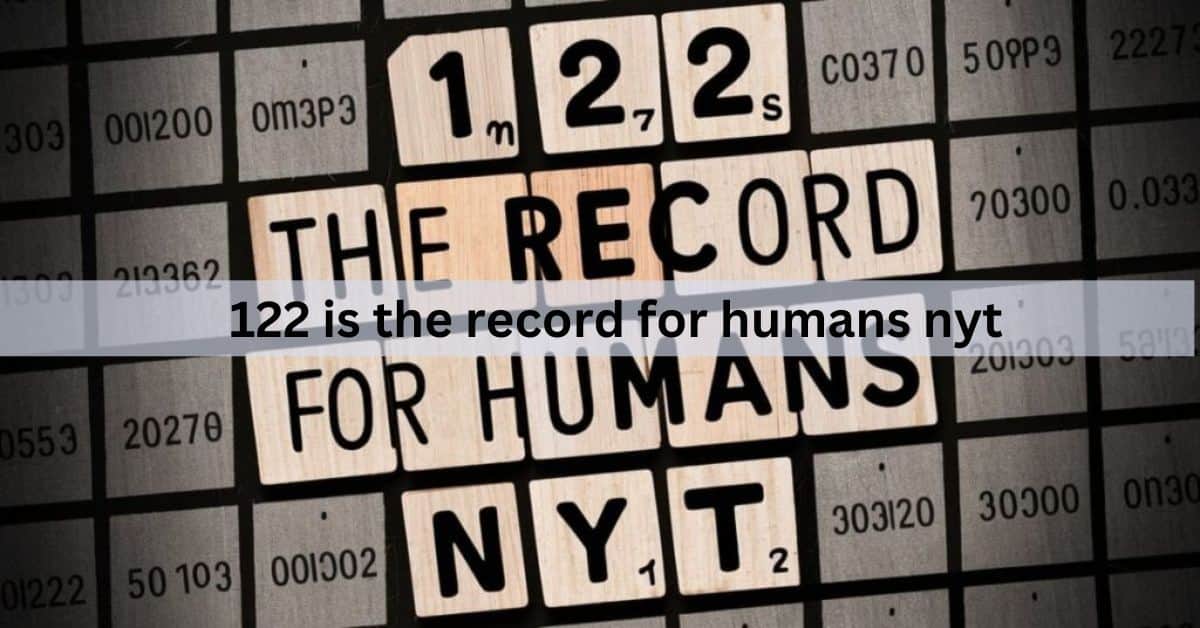The phrase 122 is the record for humans nyt might sound a bit unusual, but it refers to something truly remarkable. It highlights the extraordinary achievement of a human being living to the age of 122 years, which is the longest confirmed lifespan in history.
122 is the record for humans nyt in the New York Times Crossword typically refers to the age of the oldest verified person, Jeanne Calment, who lived to be 122 years old. She was a French woman who holds the record for the longest confirmed human lifespan, living from 1875 to 1997.
Let’s take a look at the story behind this record, who set it, and what it means for humanity. We will also look at the role of the New York Times (NYT) in popularizing this record, as well as discuss the implications of such a long life.
Who Holds the Record? – Know it here!
The record of 122 years was set by Jeanne Calment, a French woman born on February 21, 1875. Jeanne Calment lived through three centuries, witnessing many of the most important events in modern history.
She passed away on August 4, 1997, at the age of 122 years and 164 days. This achievement has been verified by several organizations and remains the longest confirmed human lifespan to date. The phrase 122 is the record for humans nyt directly refers to her incredible life and how it has been recognized globally, including by the New York Times.
The Role of the New York Times (NYT) – Don’t Miss Out!
The New York Times, often abbreviated as NYT, is one of the most respected newspapers in the world. It has a long history of covering significant events and remarkable achievements. The record of 122 is the record for human nyt was widely reported by the NYT.
This helped to spread the news of Jeanne Calment’s extraordinary lifespan to a global audience. The NYT’s coverage brought attention to the factors that contributed to her long life and sparked discussions about ageing, health, and longevity.
How Did Jeanne Calment Live So Long?
Many people are curious about how Jeanne Calment managed to live such a long life. While there is no single answer, several factors likely contributed to her longevity. First, she had good genetics, with a family history of long-lived relatives.
Second, she lived an active life, enjoying hobbies like cycling and walking until she was well into her 100s. Third, she had a positive attitude, often attributing her long life to laughter and enjoying the little things in life.
Jeanne Calment also had a healthy diet, which included olive oil, chocolate, and wine. She avoided smoking and other harmful habits, which may have also contributed to her longevity. The phrase 122 is the record for humans not only highlights her age but also encourages us to consider what we can learn from her lifestyle choices.
The Impact of the Record:
The record of 122 is the record for humans nyt has had a significant impact on how we think about aging and longevity. It has inspired researchers to study the factors that contribute to long life, including genetics, diet, lifestyle, and environment. Jeanne Calment’s life has also led to discussions about the potential limits of the human lifespan.
While 122 years is the current record, some scientists believe that humans could potentially live even longer in the future. The record has also sparked interest in the concept of “supercentenarians,” people who live to be 110 years or older.
Jeanne Calment is one of the most famous supercentenarians, and her story continues to inspire people around the world to take better care of their health and well-being.
The Role of Genetics in Longevity:
One of the key factors in Jeanne Calment’s long life was her genetics. Studies have shown that genetics play a significant role in determining lifespan. People with long-lived relatives are more likely to live longer themselves. However, genetics is not the only factor. Lifestyle choices, such as diet, exercise, and avoiding harmful habits, also play a crucial role.
The record of 122 is the record for humans nyt highlights the importance of genetics in longevity, but it also reminds us that we have some control over how long we live through the choices we make every day.
The Future of Human Longevity:
As science and medicine continue to advance, the possibility of humans living even longer lives is becoming more realistic. Some researchers believe that with the right combination of genetics, lifestyle, and medical advancements, humans could potentially live to be 150 years old or even older.
The record of 122 is the record for humans nyt may one day be broken, but for now, it remains a symbol of what is possible.
The future of human longevity is an exciting field of study, and Jeanne Calment’s record serves as a benchmark for what we might achieve. Advances in technology, such as genetic editing and personalized medicine, could play a significant role in extending human lifespan in the future.
What is the Cultural Significance of Longevity?
The record of 122 is the record for humans nyt is not just a scientific achievement; it also has cultural significance. In many cultures, elders are respected and revered for their wisdom and experience. Jeanne Calment’s long life allowed her to share her knowledge and experiences with others, enriching the lives of those around her.
Longevity is often seen as a blessing, and people who live long lives are often celebrated in their communities. The story of Jeanne Calment and the phrase 122 is the record for humans nyt reminds us of the value of a long life and the importance of respecting and caring for our elders.
The Challenges of Longevity:
While living a long life can be a blessing, it also comes with challenges. As people age, they may face health problems, mobility issues, and social isolation. Jeanne Calment herself experienced some of these challenges, especially in her later years.
The record of 122 is the record for humans nyt encourages us to think about how we can support older adults in our communities and ensure that they live fulfilling lives.
Healthcare, social support, and accessibility are important factors in ensuring that people who live long lives can enjoy a good quality of life. As the population ages, these issues will become increasingly important.
FAQs:
What does 122 is the record for humans nyt mean?
It refers to the record of the longest confirmed human lifespan, which is 122 years, as reported and popularized by the New York Times.
How did Jeanne Calment live so long?
Jeanne Calment attributed her long life to good genetics, an active lifestyle, a healthy diet, and a positive attitude.
Could humans live longer than 122 years?
Some scientists believe that with advances in medicine and technology, humans could potentially live even longer, possibly up to 150 years or more.
In A Nutshell:
The record of 122 is the record for humans nyt set by Jeanne Calment continues to be an inspiration and a topic of fascination. Her life story encourages us to think about the possibilities and challenges of living a long life, and what it means for the future of humanity.
Whether or not this record will be broken in the future, it remains a powerful reminder of the potential of human life.



